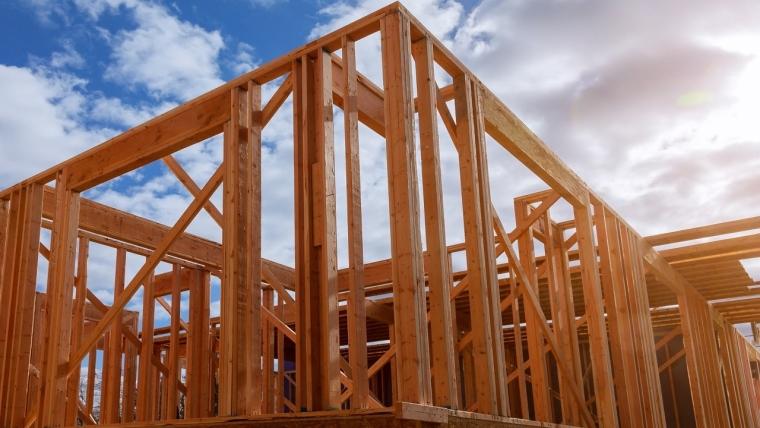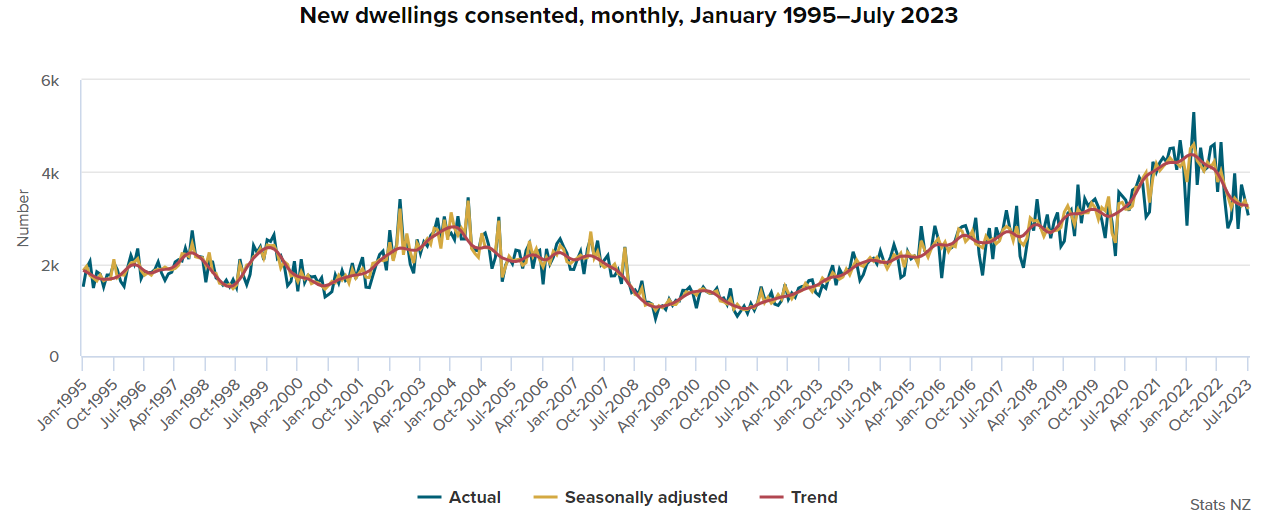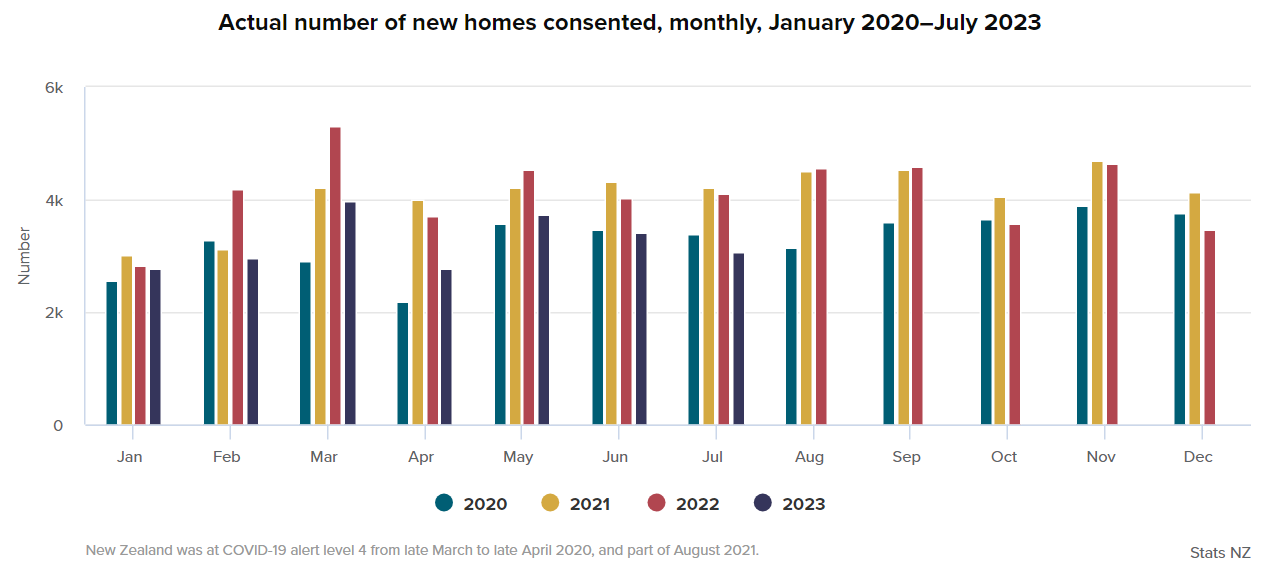
We've seen the peak and now we are seeing things sliding rapidly down the other side. The emerging downturn in residential construction is gaining speed again, with a 5.2% seasonally-adjusted drop in consents in July compared with June. This followed a 3.4% rise between May and June.
Stats NZ says there were 3,058 new homes consented in the month of July 2023 - and that's down 25% compared with the figure for July 2022.
In terms of annual figures, there were 43,487 new homes consented in the year ended July 2023 - and that's down 14% compared with the year ended July 2022.
In the year ended July 2023, the number of new dwellings consented per 1,000 residents was 8.4, compared with 9.9 in the year ended July 2022.
"Fewer new homes were consented in each month of 2023 so far, compared with the same month of both 2022 and 2021," Stats NZ's construction and property statistics manager Michael Heslop said.
In July 2023, there were 1,183 stand-alone houses consented, down 32% compared with July 2022. There were 1,875 multi-unit homes consented, down 21% over the same period. (Multi-unit homes include townhouses, apartments, retirement village units, and flats).

"The trend for the number of new homes consented peaked in early 2022 and has decreased 25% since then," Heslop said.
Trend estimates reveal the smooth and slowly changing features in a time series after removing varying seasonal effects.
As said above, in seasonally adjusted terms, the number of new homes consented in July 2023 fell 5.2%, compared with June 2023. This follows a seasonally adjusted rise of 3.4% in June 2023.
Putting things somewhat in perspective, Heslop said the number of homes consented in the year ended July 2023 is still at a higher level than any 12-month period prior to 2021.
In the year ended July 2023, there were 17,951 stand-alone houses consented, down 23% compared with the year ended July 2022. There were 25,536 multi-unit homes consented, down 6.4% over the same period.

Of the multi-unit homes consented in the year ended July 2023, there were:
- 18,451 townhouses, flats, and units (down 11%, compared with the year ended July 2022)
- 4,070 apartments (up 5.4%)
- 3,015 retirement village units (up 14%).
Stats NZ said in the year ended July 2023, all regions except Gisborne, Nelson, and Marlborough consented fewer new homes compared with the year ended July 2022.
The four regions with the highest number of new homes consented in the year ended July 2023 were:
- Auckland with 18,743 (down 14%, compared with the year ended July 2022)
- Canterbury with 7,650 (down 11%)
- Waikato with 4,121 (down 18%)
- Wellington with 3,252 (down 17%).
In terms of non-residential building consents, in the year ended July 2023, these totalled $10 billion, up 13% from the year ended July 2022. Stats NZ says this series can be influenced by price changes – non-residential construction prices (as measured by the capital goods price index) were up 6.8% in the year ended June 2023.
In the year ended July 2023, the non-residential building types with the highest values were:
- hospitals, nursing homes, and health buildings at $1.7 billion (up 53%)
- offices, administration, and public transport buildings at $1.6 billion (up 12%)
- education buildings at $1.5 billion (down 4.5%).
Building consents - type
Select chart tabs
26 Comments
I think we have enough flats on the country as of now unless everyone wants to live alone in a house/flat.
The reverse immigration is gathering pace and soon anyone semi intelligent will be out of this place.
reverse immigration?
More people leaving than coming in.
And your source for that is?
Tim from Mitre 10.
I don't have a source, I was trying to explain what the other person was getting at. Sorry for the confusion.
*Emigration.
nguturoa, the opposite of immigration is emigration.
Maybe if people listened to me last year…Including this website which was reporting as if the boom would keep going and going.
I expect at least a further 10-15% drop. We will probably land about 35-40% down from peak.
And CCCs - what actually gets built - will fare even worse.
You nailed it
Lets be honest here though, anyone that saw interest rates going up along with the high prices of land and materials could have picked it (I did too). You would have had to ignore these to think it was going to continue. And the site reports news mainly, which is what is happening, with only a few opinion pieces all of which were pointing out the same thing, as I remember.
Yes but HM called it loudly and correctly. Well done HM !
Sales were way down LONG before it showed up in consents stats.
From first hand experience it is extremely quiet in the construction sector. New house builds are almost non existent. Home extensions, renovations are in the same category. It’s getting real tough out there to keep staff occupied. Redundancies are just around the corner.
I'm an estimator in civil Infrastructure, 3 waters etc. Everything has hit a massive pause over the last 6 months. Production is grinding to a halt with quite an empty book of work for the foreseeable future. Could be the election/3 waters etc.
Since horizontal infrastructure typically precedes residential construction (except for infill housing), this could be a sign of things to come?
I don't think civil has slowed down in Hawkes Bay, for obvious reasons. Having a heck of a time just trying to get quotes for a couple of new heavy vehicle crossings. Not sexy work but it would still be income.
Contact Haigh Workman Ltd. Not based in the Hawkes Bay but I have an increasing workload in that part of the country.
I count 7 new projects breaking ground in my suburb in this quarter alone, each building tens of 2 and 3bdr townhouses; ditto trend in the surrounding suburbs.
People still need a place to live, and townhouses are affordable options for young families looking to move into good school zones with decent transport connectivity. Asian migrants particularly don't know the first thing about maintaining a house or lawn, once again making brand-new townhouses desirable.
This trend is unlikely to keep the "boom" going though since construction activity will follow the limited demand for well-planned houses in good neighbourhoods.
It will all work as long as they can find buyers at a price that means they make a profit.
If house prices are dropping and materials/service/land costs are rising common sense says it will be increasingly unlikely to build new builds.
That said some may now factor in the high probability of a national govt in a couple months who will put a floor under, and then start to stoke the housing market - so its a reasonable bet to build now expecting prices to be x% higher in 3-6 months and thus by the time houses come on the market they will be profitable.
If it were me i would be building houses suited to housing many low skilled immigrants on a budget who share amenties.. lol
That doesn't seem an absurd idea given how we're importing planeloads of low-skilled migrants while already facing record high living costs.
What concerns me is how the government expects our health and education system to cope with this crazy influx, considering every foreign worker here with their families on a 2-year visa or more is eligible for those public-funded services?
Scores of children of new migrants are turning up to schools here with little English skills and teachers have limited resources to assist these children. Some are reporting a 70% increase in enrolments with additional language needs.
My kids are finding themselves working as part time Russian/English translators to help out their teachers at primary school dealing with recent immigrants. Funny, but good experience.
Thank god - you might actually be able to book inspections and get a response from Council now...
Or get a tradie to give a crap to return your call for some small work.
Construction slow down, yes. Bust no. Perhaps a return to more sane construction levels where you won't get a response mentioned by one or two commentators.
Isn't there plenty of flood damage work in Akl so new builds down but not other construction work.
Tookey bloke from Auckland University nailed cycle of housing building.
Crux is that it is out of synch with buying trend. Both dictated by borrowing rate of interest but builders need to have payments coming through to fund debt prior to people finishing purchase. Loans that builders have were taken at far lower rates and are being re-priced higher just at time that revenue from down payments dries up. Pincer movement of these two trend lines will lead to longer period of downturn for building and development in private sector.
On top of that, the buying cycle will remain below 3300 pcm trend line (Auckland only) (av of last 15 years) until about April 2025, because market over-bought for 12 months at height of feeding frenzy and reversion to mean takes a while.
Great analysis Mike

We welcome your comments below. If you are not already registered, please register to comment
Remember we welcome robust, respectful and insightful debate. We don't welcome abusive or defamatory comments and will de-register those repeatedly making such comments. Our current comment policy is here.